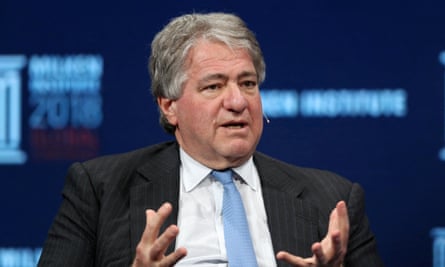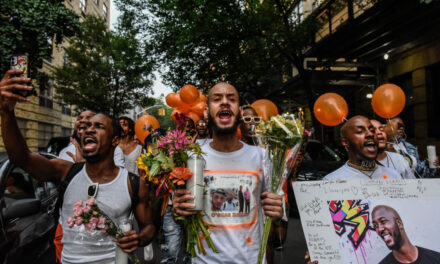When a woman filed suit in Manhattan federal court last week alleging extreme abuse at the hands of Jeffrey Epstein and his now convicted madam Ghislaine Maxwell, her accusation of being victimized by their sex trafficking operation was among the most harrowing.
The woman, identified in court papers as Jane Doe, has autism, making her particularly vulnerable to purported grooming – and subsequent alleged abuse at the hands of the late financier’s rich and powerful friends.
Jane Doe alleged that billionaire investor Leon Black – whom a US Senate committee is investigating in relation to a $158m payment to Epstein for tax and estate-planning services – was among these associates.
Court papers allege that in 2002, at Epstein’s ritzy Manhattan townhouse, he passed her off to Black – whom, she alleges, raped and sexually abused her. Another woman, Cheri Pierson, sued Black in late 2022 and she also accused him of raping her at Epstein’s Upper East Side manse.
Black denied has adamantly denied these allegations.
But some involved have questioned why Black does not appear to be facing more legal scrutiny. While a 2021 Vanity Fair report claimed that Black was facing a “criminal probe” related to several accusations, little is known about whether it is moving slowly or has stopped altogether.
“When he took office, Alvin Bragg vowed to place a priority on the sex-crimes unit, which had faced criticism under the prior administration. At a press conference in June 2022, Bragg announced a new special victims unit and said again, that sex crimes and trafficking is a priority,” Jeanne Christensen, a partner at Wigdor LLP representing Doe and Pierson, said in a statement.
“Fast forward, and the new chief of the unit is gone and a second chief in place, but it does not appear that the issues are a priority. Instead, two years have passed and Leon Black’s powerful lawyers appear to have prevented Bragg from moving forward on any prosecution of Black, while Black meanwhile paid $62.5m secretly to the Attorney General’s office in the USVI, on top of the $158m he paid to Epstein that remains a mystery such that a US Senate committee is looking into the issue in depth.”
“If trafficking and sex crimes is truly a most important issue for Bragg, we would expect more to be done,” Christensen also said.
But the details emerging in Doe’s suit tell a story of shocking exploitation and abuse. The woman’s account of trafficking is similar to other Epstein victims but compounded by heightened defenselessness. While Doe has “above-average intelligence,” her autism meant that she perceived the world – especially social interactions – in a “childlike” way.
This set the stage for Epstein’s cohorts to lure him into his twisted web. During a cheerleading camp in summer 2001, an instructor named “Elizabeth” took a special interest in Doe. Elizabeth, with the involvement of Doe’s parents, told the girl that she would start living at her home several times per week. Soon thereafter, this resulted in near-permanent residency, the suit claims.
Elizabeth, who engaged in abusive behavior such as denying food and locking her in a room, and her boyfriend started “grooming” Doe, such as “forcing Plaintiff to watch them have sex,” court papers allege. “She told Ms Doe that if she ever told anyone about the things she and Charlie made her do, that Plaintiff would go ‘missing,’ and since no one loved or cared for her, she would not be missed.”
Late that summer, the then 16-year-old Elizabeth allegedly brought Doe to an adult “party” outside Washington, where she was approached by a woman with dark hair and a British accent, “who introduced herself to Plaintiff and sat with her, feigning interest in her safety and wellbeing.” Doe later learned that this woman was Maxwell.
The following week, Elizabeth sent Doe to Palm Beach on a private plane, and she was brought to Epstein’s home; soon after, Maxwell showed her how to ‘make Jeffrey happy’” in a sexualized massage. “Both Maxwell and Epstein gave Plaintiff ‘happy claps’ for her brilliant success, the way parents do with five-year-olds.’”
Later, Elizabeth told Doe she was being sent to New York City; Charlie was bringing her to see Epstein’s “‘special friend,’ a man named Leon Black.” After arriving at Epstein’s townhouse, Doe alleges, “she was summoned to Epstein”, who was standing with a “huge older man”.
“Epstein introduced Plaintiff to Leon Black, using his full name, and told her that Black was ‘important’ and ‘special’ to Epstein,” the civil suit alleges.” Plaintiff was struck by Black’s immense size. Plaintiff’s initial impression of Black was that he looked like an ‘ogre,’ and she felt frightened.”
Epstein told Doe that she was his “special girl” and picked her to provide his “special friend” a “massage treatment” like he received, “meaning that it would involve sexual intercourse and she was expected to strip naked”. The lawsuit alleges that Black ultimately forced himself on her.
Prior to this alleged incident, Elizabeth allegedly instilled fear in the extremely vulnerable Doe.

“Elizabeth emphasized that Leon Black was a ‘very important and special person’ to ‘Jeffrey,’ and she threatened Plaintiff that she ‘better’ receive a ‘good report’ that Plaintiff was a ‘good girl’ for Jeffrey and his important, special friend,” the suit states.
The language Doe describes surrounding terms like “good” and “bad” speaks to how persons with intellectual and developmental disability are especially at risk for sexual abuse.
“There is a high incidence of women, especially women of color, with intellectual disabilities, developmental disabilities, women in general that have intellectual and developmental disabilities, have higher numbers of being sexually compromised, being raped,” said Sharon McLennon Wier, executive director of Center for Independence of the Disabled in New York City.
That’s because “this particular group is not necessarily educated or trained about what is healthy touching versus inappropriate touching”.
Difficulty with social cues can compound this and delay reporting. “The person may not understand that this was something that was wrong, or they may question it, and also they would need to be able to talk to someone that they feel close to, to even say, ‘hey, this happened to me,’ to kind of figure it out.”
“What I read about Jane Doe sounds horrific,” Weir said, saying that prosecutors should look at her allegations. “Like any other person, regardless of disability, if someone did not give consent then it’s a crime. They should investigate to find out exactly what happened.”
Asked about advocates’ concerns, the Manhattan DA’s office said: “When any survivor comes to us, our dedicated sex crimes prosecutors immediately launch a thorough investigation including witness interviews, extensive evidence-gathering, and a careful analysis of the facts and the law. That is what consistently guides us, regardless of power, money, or any external pressure: following the facts and the law, while centering survivors.”
Asked about whether there’s a criminal investigation, Black’s camp said: “With respect to the question on DA Bragg, we have no comment.”
Susan Estrich of Estrich Goldin, an attorney representing Leon Black, said of Doe’s suit: “This is a frivolous and sanctionable lawsuit. Mr Black has never met this individual.”
“These vicious and defamatory lies, masquerading as allegations, have been intentionally manufactured by the Wigdor law firm as part of the firm’s vendetta against Mr. Black for vigorously and successfully defending himself over the past two years. Wigdor’s prior case against Mr. Black was recently thrown out by the Court and this one will be too,” Estrich said, apparently referring to a now-dismissed lawsuit brought by Guzel Ganieva.
“These allegations – about an incident that supposedly took place 20 years ago – are totally made up and are entirely uncorroborated,” Estrich also said. “This sham proceeding will be promptly dismissed and will provide further ammunition for Mr Black’s pending sanctions motion against the Wigdor firm.”
Not all think that lack of information about a potential inquiry is a sign of stagnation nor indicative of any facts one way or another.
Susan Crumiller, a victims’-rights attorney who founded Crumiller PC, cautioned against making assumptions about any possible criminal investigation in general.
“We all often feel impatient when we’re looking at investigations from the outside, and the truth is all we can do is speculate,” Crumiller said . “So, I just don’t think it’s wise or fair to really put value judgments on what we can see. We’re just not privy to it.”
-
Information and support for anyone affected by rape or sexual abuse issues is available from the following organisations. In the US, Rainn offers support on 800-656-4673. In the UK, Rape Crisis offers support on 0808 500 2222. In Australia, support is available at 1800Respect (1800 737 732). Other international helplines can be found at ibiblio.org/rcip/internl.html




